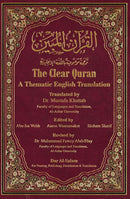The Clear Quran: A Thematic English Translation ,Translated by Mustafa Khattab; Edited by Abu-Isa Webb, Aaron Wannamaker, Hisham Sharif; Revised by Muhammad Fawzy AbdelHay.
It was a summer day in Toronto and I had just finished leading the Friday congregation at a downtown mosque. On the way home I had an unlikely encounter, since all my cab-drivers in Toronto had been Muslims so far. That day my driver was non-Muslim, so he was able to identify me as Muslim simply because of my traditional Arab garb. Out of nowhere, he comment-ed, "I think Muslims are good, but Islam is evil!" Taken aback by this Fox News style rhetoric, I responded, "Well, first of all thanks for the compliment about Muslims, but why do you think Islam is bad?" He replied, "Because your holy book calls me an animal." In astonishment, I answered, "I know the whole Quran by heart and I don't think it says that anywhere!" He cited
8:55, and I responded by telling him that the word däbbah in Arabic does not mean an animal but a living being (see 24:45). He persisted, saying that his translation says so. I later checked many popular translations by Muslims and non-Muslims and realized that the man was right. This fateful encounter opened my eyes to the rampant mistranslations and misrepresentations of the Ouran.
The Ouran was revealed to Prophet Muhammad (A) in the 7th century and was not translated into English by a Muslim until the 20th century.
Many Muslims had long believed that the Quran should only be read in Arabic, the original language of revelation. This led to many inaccurate, ill-willed translations by missionaries and orientalists which explains why we still see some words like 'holy war' and 'infidels' as well as many theological inaccuracies in some existing translations. All this leads to endless false assumptions about Islam and Muslims. Some Muslim translators are no better off than their non-Muslim counterparts because they are not well-versed in Arabic, or English, or Islamic studies, or translation, or all of the above. Looking up words in an Arabic-English dictionary or copying earlier translations when frustrated does not always guarantee accuracy in translation. There are some noteworthy modern translations like that of Dr. Ahmad Zaki Hammad (2007) and Dr. M.A.S. Abdel Haleem (2004), but many are either overtranslated, making it difficult for laypeople to understand, or undertranslated, doing a great disservice to the Quran. This is why I saw a need for an accurate, smooth, and accessible translation.
To achieve accuracy, I have made use of the greatest and most celebrated works of old and modern tafsir (Quran commentaries), and shared the work with several Imams in North America for feedback and insight. For clarity, every effort has been made to select easy to understand words and phrases that reflect the beauty and power of the original text. Along with informative foot-notes, verses have been grouped and titled based on their themes for a better understanding of the sûrahs, their main concepts, and internal coherence.
Thanks to our editing and proofreading teams led by Abu-Isa Webb, I believe that what you are holding in your hands now is the most accurate and eloquent translation of the Final Revelation: The Clear Quran.
Mustafa Khattab
Translation, 2018.
696 p. ; 24 cm.
ISBN 978-977-717-393-3











